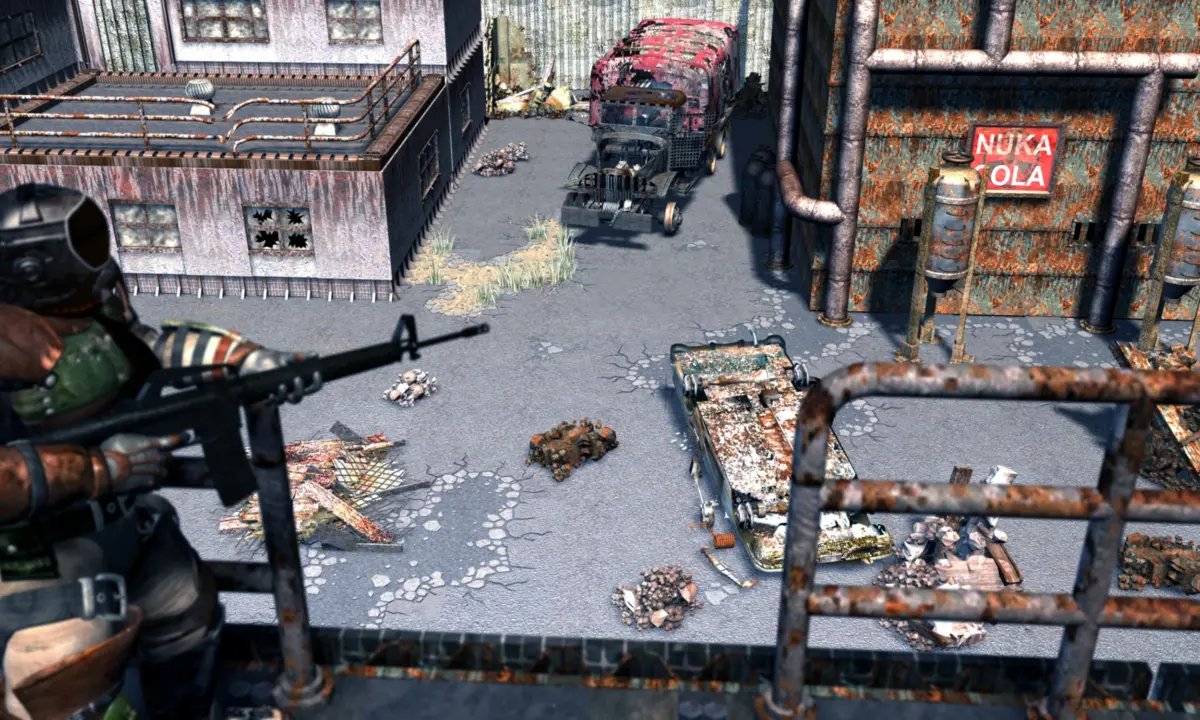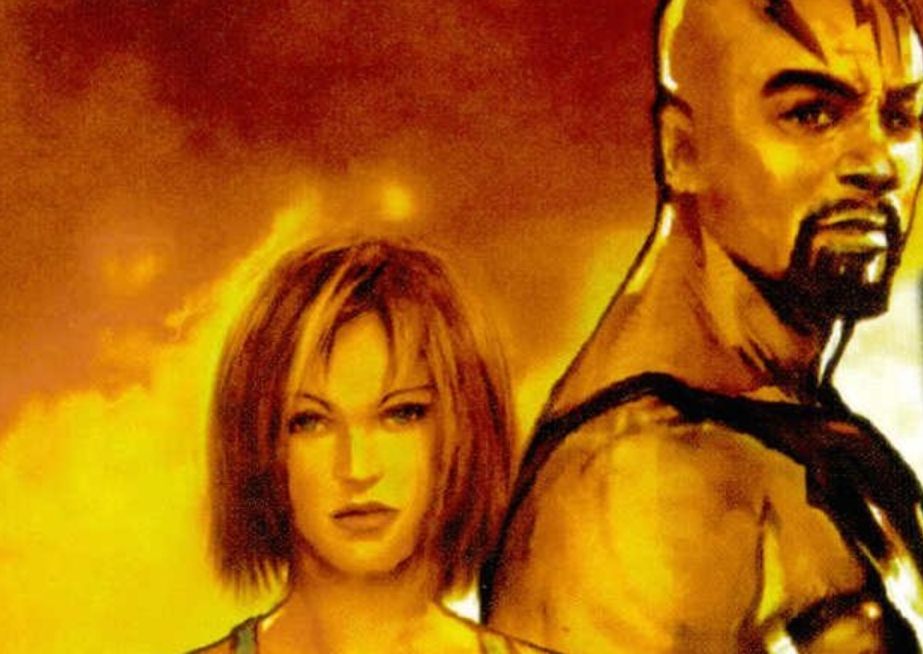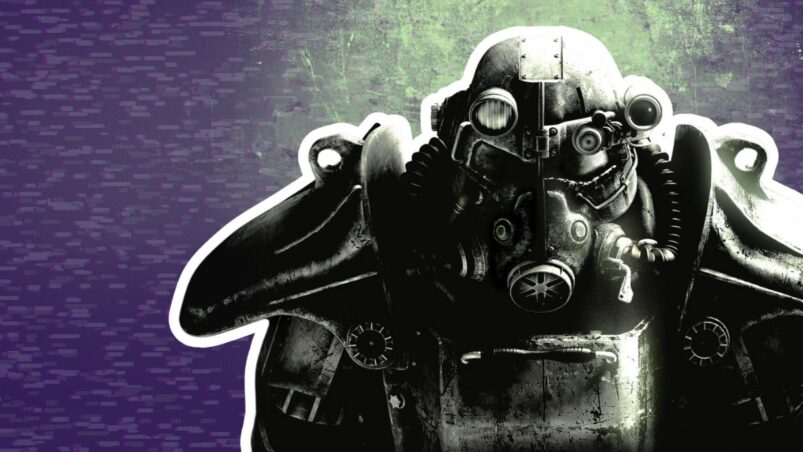War never changes, but the Fallout series certainly has. What started as a simple turn-based RPG evolved into the sprawling open-world game franchise people know it as today.
Throughout the years, Fallout has had its ups, downs, and its way, way downs. Just like the wastelands, the franchise is dotted with the ruins of canceled and forgotten games.
What’s weird though, is the fact that Bethesda isn’t the developer or even publisher in charge of any of the canceled Fallout games. All five started and ended with the previous owner of the Fallout IP: Interplay Entertainment, which you may recognize as the creator of Baldur’s Gate, Wolfenstein 3D, and the original Alone In The Dark, which later ran into its own troubles.
If you want to open up the Vault of canceled Fallout games over the years, we’ve compiled the biggest failed names to date.
Fallout Extreme

The first Fallout game to ever get nuked was Fallout Extreme. One of Interplay Entertainment’s subsidiaries, 14° East, came up with the idea for the game in 2000. Unfortunately, that’s all it was: an idea. The game never made it past the conceptual phase. The public probably would’ve never even known it existed if not for the proposal getting leaked in 2010.
Fallout Extreme was supposed to be a squad-based first or third-person shooter, which would have given it more in common with Bethesda’s Fallout games. The player is given a squad of four characters, each with unique abilities. You can switch control between squad members to fight and solve puzzles. Sounds kind of like Brothers in Arms meets Marvel Ultimate Alliance, right?
Plotwise, you will lead a group of revolutionaries to stop the Brotherhood of Steel from militarizing the US. Though the Brotherhood intends to bring back civilization, their plan is meant to only benefit pure blood humans. Meaning the radiation victims and mutant populations have no place in their future.
After beating the Brotherhood in their main stronghold in Alaska, you discover the true reason for their desire to arm the USA. Enemies from the East are coming. This new threat was never specified, but apparently, Fallout Extreme would have taken your team through the Bering Strait, Russia, Mongolia, and eventually, China. So, it would’ve been the first Fallout game to ever have a setting outside of the USA.
Fallout Extreme was intended to come out on PlayStation 2 and Xbox but was rejected after its proposal. The reason for the rejection is unknown, but consoles did later get the completely forgettable Brotherhood of Steel. Not the good Brotherhood of Steel, either.
Fallout Tactics 2

14° East was on a bad luck streak, because only a year after Fallout Extreme, another one of their games was canceled: Fallout Tactics 2.
Work on Fallout Tactics 2 began soon after the release of its predecessor, Fallout Tactics: Brotherhood of Steel, in 2001. The developers of the first Fallout Tactics, 14° East and Micro Forté, planned to launch it on PC, just like its predecessor. However, it was soon canceled because it didn’t meet financial expectations. A shame, since the first Fallout Tactics was pretty well received.
Gameplaywise, not much is known about Fallout Tactics 2. It presumably would’ve been similar to the first Fallout Tactics where you can choose between different styles of turn-based combat. The focus would’ve also probably been on strategy rather than the detailed world-building and roleplaying of the mainline Fallout games.
As for the plot, Fallout Tactics 2 picks up from the Barnaky ending of the first Fallout Tactics.
If you need your memory jogged, the Barnaky ending is where General Barnaky sacrificed his brain and became the new Calculator. He used the Calculator robots and the Brotherhood of Steel to take over the United States and “restore order”. That’s all well and good unless you were a mutant, in which case you would have been pushed into internment camps and treated as a lower life form. A Mutant Liberation Army was formed but eventually failed.
As if the mutant population hasn’t suffered enough, the Fallout Tactics 2 plot was about an irradiated G.E.C.K. that mutated the local flora and fed on wildlife. The player’s mission was to find the G.E.C.K. and put an end to it.
Concept art of a wicked-looking mutant crocodile also surfaced. It was most likely a new enemy that could’ve been right up there with the Yao guai and Deathclaws. If only Interplay had the bottle caps to keep the project going.
Van Buren (The Original Fallout 3)
Fallout 3 is such an iconic game, not just to the franchise, but to gaming in general. It’s hard to imagine that now classic game could have been completely different.
Van Buren was the codename for Interplay’s next major installment to the Fallout franchise in 2003. There’s no question that it was supposed to be Fallout 3. The title screen had Fallout 3 written on it, and the logo for Van Buren is just a red circle with “F3” written on it.
The codename was derived from Martin Van Buren, the 8th president of the United States of America. Though whether there’s a deeper meaning as to why they named the game after the president is unknown.
This time, it was being made by another Interplay Entertainment subsidiary called Black Isle Studios. You may recognize them today as Obsidian Entertainment.
Surprisingly, Van Buren wasn’t the only major canceled game from Black Isle Studios at the time. They were apparently also working on a game called Baldur’s Gate 3: The Black Hound. Van Buren was even supposed to use the Jefferson Engin from the canceled Baldur’s Gate 3. Hard to imagine a Baldur’s Gate 3 from the early 2000s and not the bear-loving sim we have now.
The reason for Van Buren’s cancellation? Interplay was suffering from numerous legal disputes regarding their D&D games. After tons of layoffs and cutbacks, the Black Isle Studios team slowly left the project one after the other. Interplay also didn’t seem to have much faith in Van Buren’s success. They began pulling people from it to work on their other projects. Eventually, this led to Black Isle Studios shutting down, officially ending work on the game.
Unlike Bethesda’s Fallout 3, Van Buren was supposed to be a top-down RPG similar to the first two Fallouts. What’s new is the choice to play the game using turn-based or real-time controls.
The main character in Van Buren had the nickname “The Prisoner”. As the name implies, the game starts with you waking up in prison. Whether you’re a true criminal or wrongfully convicted is up to you to decide during the character creation.
Luckily for you, the prison comes under attack, which leads to your cell door flinging open. You escape and have your typical Fallout open-world adventure throughout Colorado, Arizona, Utah, and Nevada.
Unlike the other games in this list, Van Buren was already pretty deep into development when it was canceled. It even had its endings already written. So much is known about it, that multiple fan-made projects have tried to fully recreate it.
Fallout: Brotherhood of Steel 2

In 2004, Interplay started development on Brotherhood of Steel 2, possibly as a last-ditch effort to justify the franchise’s future. Spoiler alert: it did not go well.
Like Fallout Extreme, Brotherhood of Steel 2 was never publicly announced, and the only reason people know about it now is because its design document leaked in 2009.
Brotherhood of Steel 2 was canceled likely due to Interplay staff layoffs in 2004. After Black Isle Studios shut down in 2003, things didn’t get any better for Interplay. Add that to the fact that the first Fallout: Brotherhood of Steel game didn’t even sell that well, and you can see why this project never came to fruition.
Brotherhood of Steel 2 gameplay would’ve likely been similar to its predecessor, a very ordinary top-down shooter for the PlayStation 2 and Xbox. They did mention a couple of improvements in the design document, such as a new stealth system and a reputation system, similar to the karma system in Fallout 2, 3, and New Vegas. Apart from the images in the design document though, there is no footage of BoS 2 gameplay.
So, was Interplay, the company that birthed one of the most iconic video game series, destined to end its run with the mediocrity that was Fallout: Brotherhood of Steel? Well, they made one final attempt with Fallout Online AKA Project V13.
Fallout Online/Project V13
Years before Fallout 76 released to a wild array of fart noises, Fallout Online or Project V13 was supposed to be a PC MMORPG developed by Interplay and Fallout creators Chris Taylor, Mark O’Green, and Jason Anderson.
The concept for Fallout Online spawned in November 2006 when Interplay filed a Form 8-K Filing to the SEC regarding their intent to make a Fallout MMO.
In 2007, Bethesda purchased the Fallout IP but allowed Interplay to continue work on Fallout Online considering they followed certain requirements. A few years later, Interplay failed to meet those requirements, which led to two lawsuits from Bethesda and eventually the game’s official cancellation.
Based on the pre-alpha images, Project V13 was going to be a third-person MMORPG. However, it would’ve run on a different engine from Bethesda’s Fallout 3, so it might’ve played and looked differently.
Interplay didn’t give up after the first cancellation though. They decided to start another project with the same name, probably hoping to turn “Project V13″ into its own IP separate from Fallout. But even their second attempt was eventually forgotten and abandoned. Thus ending Interplay’s involvement with Fallout, and Bethesda’s start with the franchise. Fallout 3 soon came out in 2008, and the rest is history.
Again, it’s fascinating that all these canceled Fallout games are from a company that isn’t Bethesda. But a lot of these canceled games were only discovered through leaks years after their cancellation. So who knows what Bethesda has hidden in their vaults right now.
READ NEXT:
Some of the coverage you find on Cultured Vultures contains affiliate links, which provide us with small commissions based on purchases made from visiting our site.

